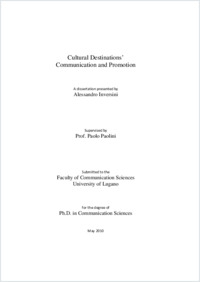Cultural destinations’ communication and promotion
- Inversini, Alessandro
- Paolini, Paolo (Degree supervisor)
-
05.05.2010
134 p.
Thèse de doctorat: Università della Svizzera italiana, 2010 (jury note: Magna cum laude)
New media in tourism communcation
cultural destination
cultural tourism
etourism
online reputation in tourism
destination online communication
destination online promotion
English
This research focuses on the online communication in the cultural destinations’ domain. Cultural destinations’ online communication has been poorly studied so far, and this work intends to analyze, describe and understand the domain. Destinations websites and particularly cultural destinations’ websites have their own communication strategies but they act as hubs with respect to the other destinations’ stakeholders (e.g. cultural attractions but also accommodations, associations, etc). Thus the objective of the research is to study the peculiarity of this specific online communication domain. Moving from this gross grain objective, research questions and hypotheses have been created. The research uses a proven framework for online communication: the Website Communication Model (Cantoni and Tardini, 2006); this model has been used within the research framework to deeply understand the peculiarity of cultural destinations’ online communication. Thanks to a comprehensive methodology based on such a framework, the objective and the research questions have been investigated. Results show that there are differences between cultural destinations’ and leisure destinations’ online communication, and that online information competitors (mostly unofficial websites) are spreading on the internet the same contents as destinations’ websites, but they are marketing the destination in an emotional way. Besides, thanks to case studies, the online communication strategy of three UNESCO listed destinations has been studied, investigating all the four pillars and fifth element of the Website Communication Model.
- Language
-
- English
- Classification
- Economics
- License
-
License undefined
- Identifiers
-
- RERO DOC 20781
- URN urn:nbn:ch:rero-006-109565
- ARK ark:/12658/srd1318301
- Persistent URL
- https://n2t.net/ark:/12658/srd1318301
Statistics
Document views: 372
File downloads:
- Texte intégral: 328
